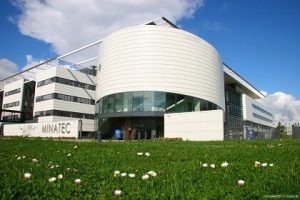Contact persons:
Dr Oliver Krammer, Dr. Attila Bonyár
Budapest University of Technology and Economics, Faculty of Electrical Engineering and Informatics
H-1111 Budapest
Egry József u. 18.
Hungary
Description of VIK-ETT
The Faculty of Electrical Engineering and Informatics (VIK) of Budapest University of Technology and Economics (BME) carries on the traditions of the above 230-year-old University. The faculty is represented by the Department of Electronics Technology (ETT). The mission of ETT is to teach and research all the aspects of realizing electronic components, circuits, and systems. The department directs its energies towards microelectronics packaging and interconnection technology, including printed wiring board technology; soldering technologies; thin- and thick-films; thermal management; sensors, actuators; laser technology; reliability and quality management; computer-aided design, manufacturing and production control.
Processing platform
- 3D Printers (Objet Eden 250, Anycubic Photon Mono X)
- Mechanical prototyping (Protomat S42)
- Polymer casting workstation (custom)
- Thin-film deposition, vacuum evaporation system
- Assembly of electronics products (DEK248 stencil printer, TWS pick&place machines, ASSCON vapour phase soldering systems)
- Laser processing equipment (Coherent Avia UV Nd:YAG, Epilog I8 CO2)
Modelling platform
- Ansys academic license
- Matlab academic license
- Mentor academic license
Characterization platform
- Atomic Force Microscope (AFM, Veeco (Bruker), diInnova)
- Scanning Electron Microscopy (SEM, FEI Inspect S50)
- X-Ray Microscope (XiDAT XD6600)
- Scanning Acoustic Microscope (SAM, Sonix HS 1000)
- X-Ray Micro-Fluorescence Analyser (Spectro, Midex M)
- UV/VIS/NIR/IR Spectrophotometer (Avantes)
- Electrochemical workstation (Voltalab PGZ301, PST50)
- Surface Plasmon Resonance imaging equipment (custom-built)
- Fourier-Transform IR Spectroscopy (FT-IR, Bruker)




 Minatec – CROMA
Minatec – CROMA